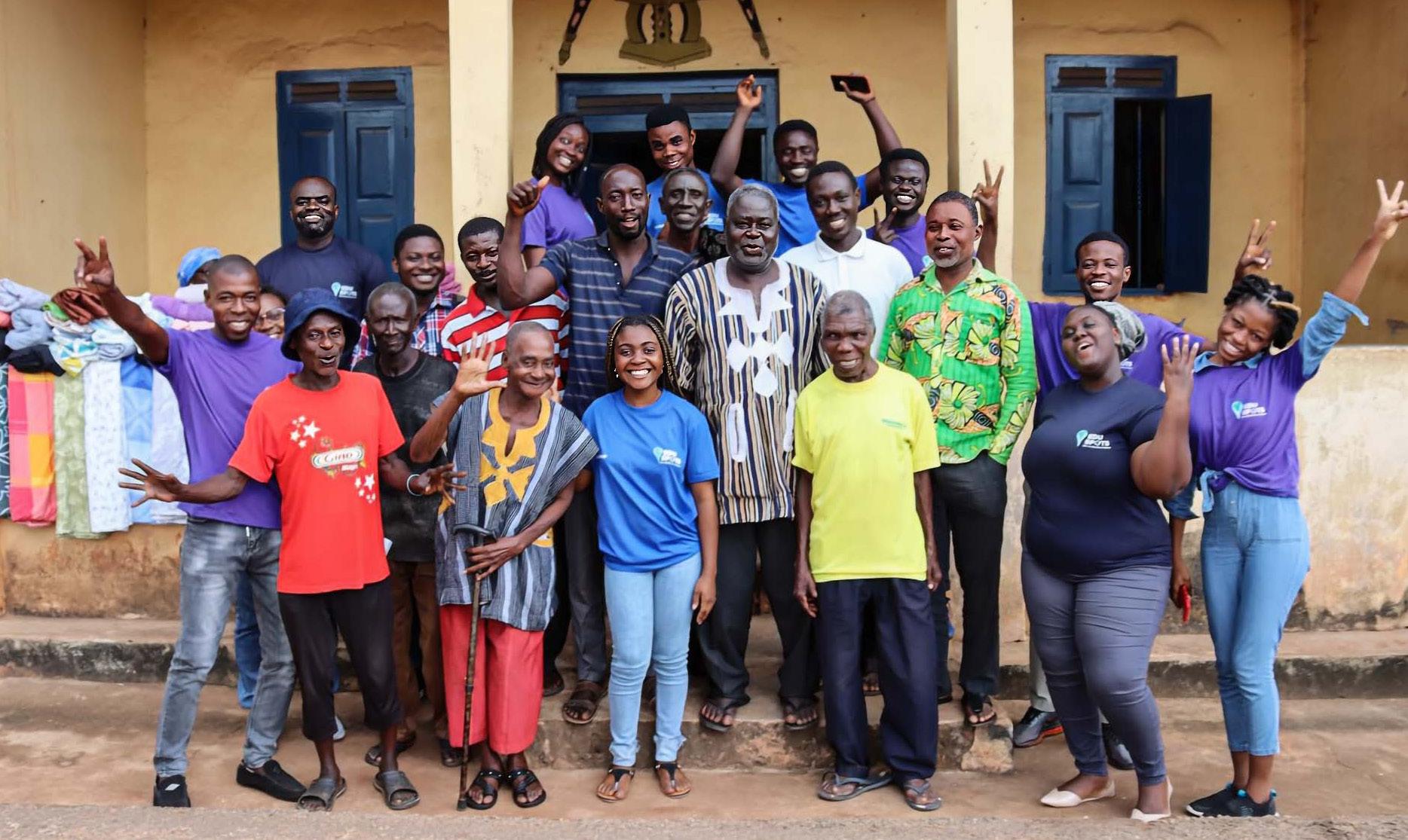
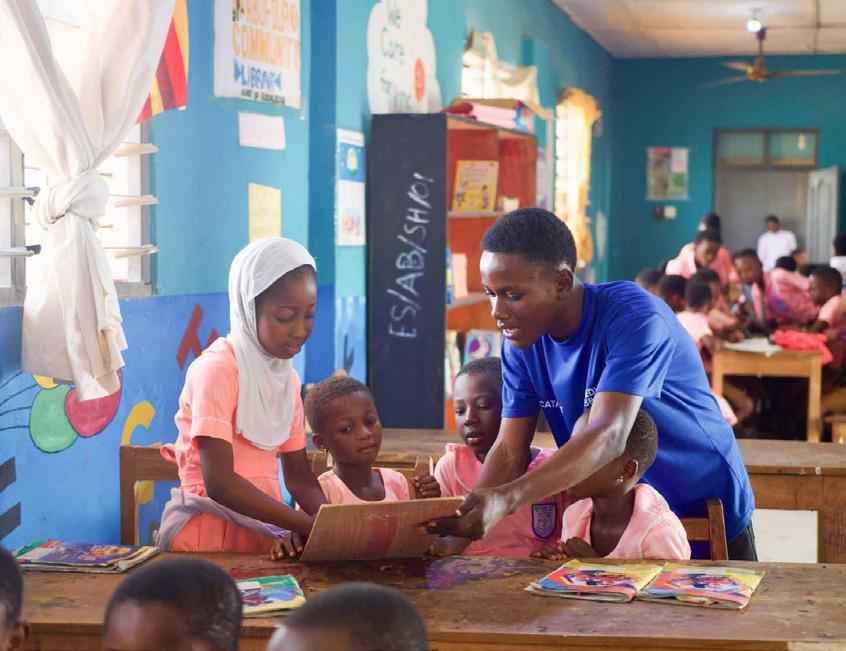



An introductory guide for local teams, schools, NGOs, partners and wider community members.
I see a group of people full of passion to make others’ lives better - even when I’m ready to sleep, I always think about this and it motivates me to do more.
(Seidu Yayha, Ejura Spot Founder & Catalyst, now also staff Middle Regional Coordinator)


Every Spot in the EduSpots network has a unique origin — together, these stories of aspiration, resilience, and creativity form a vibrant tapestry of community-led change.
The very first Spot was established in 2015 in Abofour, in Ghana’s Ashanti Region. It was created by a local team of teachers, led by the Addae family, grounded in principles of community ownership, volunteer leadership, strong school partnerships, and a shared commitment to educational equity.
This Spot emerged in response to a neighbouring library housed within a private school, where donated books and resources were rarely accessible to learners, teachers, or the broader community. The lack of open access and active local leadership sparked a new vision — one where educational spaces are truly shared, inclusive, and driven by the communities they serve.
The group also sought to rethink the role of foreign students, who had previously been taking on responsibilities: instead of leading on the ground, they engaged remotely, learning about Ghana’s rich history, education system, and colonial history. Their role is to support—raising funds and awareness in solidarity with local Spot teams, aligning efforts with community-led goals and a shared commitment to social justice.
The concept of a ‘Spot’ draws inspiration from the familiar Ghanaian idea of a drinking spot — communal spaces found in every town, each with its own name, character, and rhythm. Similarly, EduSpots enables communities to create their own learning hubs — shaped by local identity, driven by local assets, and grounded in community aspirations.

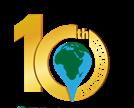
In 2017, Gloria Addae and her students launched the first EduLit Club (now DigiLit), pioneering a distinctive model that blends formal and informal education with a strong emphasis on student leadership. Her work laid the foundation for the learner-centred, community-driven approach that defines our educational philosophy today.
From that single initiative, the ‘Spot’ model began to grow organically. With the involvement of students, teachers, and partners from across Ghana and beyond, a grassroots movement took shape — evolving into the vibrant network across 12 regions of Ghana and Kenya that EduSpots is today.
EduSpots’ current model and programmes have been co-created with over 500 voluntary local Catalysts. More than 50% of our staff and peer mentors have emerged from these Catalyst pathways, ensuring deep-rooted community leadership across the network. A Catalyst Committee plays a central oversight role, working closely with the Ghana and global NGO boards and the senior leadership team to shape strategy and direction.
In 2025, our Global and Ghana boards are chaired by Professor Gloria Agyemang, former Executive Dean of the School of Business and Management at Royal Holloway, University of London, and Dr Richard Amoah, Head of Research and Stakeholder Engagement at Education Sub-Saharan Africa.
We are also proud to be supported by our Ghana Patron, Professor Elsie Effah Kaufmann, who regularly engages with our Catalysts and actively champions our mission to reimagine future-ready education through community-led innovation.


Our vision is of a world in which communities unite to create the futures they want to see through education!
1
Your team will gain the training and mentorship you need to set up an active education hub named a ‘Spot’ in either a school or space, where you and your team will gain support in running clubs for learners. The purpose of the Spot is to promote fun, community-rooted and futureready education!
The initial focus for Catalysts is on training and leadership activities across team-building, community engagement, safeguarding, resource and financial management, fundraising and communications.
This will be through 3 stages of leadership programmes across a three year period, enabling you to build a sustainable model of change, before entering in the longer term network leadership
2
Educational and Keeping Spots Safe training & coaching
You will gain access to online educational resources and training that will enable you to lead high-quality and future-ready education clubs, supported by specialists.
The themes for 2026 stretch across early childhood education, digital and literacy skills, STEM and environmental education and gender equity. You can join one theme in year 1, and 1-4 themes in years 2 onwards.
You will also engage in our Keeping Spots Safe badge as key to being part of EduSpots, ensuring strong safeguarding systems are in place, and promoting student voice.

You will be a part of EduSpots’ dynamic network stretched across 12 regions of Ghana and Kenya, sharing your educational and leadership ideas with over 500 local changemakers.
Through the network model, you will access opportunities, motivation, peer support and recognition; we expect Catalysts to give as much as they gain in the spirit of Ubuntu.
Spot teams that pass through the first 6-month programme successfully will be given 2 tablets and a wifi kit, alongside sustainable resource kits related to their learner strands and books as far as funding and donations allow.
EduSpots has a model of deeply rooted community ownership and leadership which means that communities bear responsibility for ongoing costs and lead local fundraising and resource mobilization


What key factors are we looking for to join the
We’re not just implementing a pre-set model. Our ideas and experiences are actively shaping how EduSpots evolves. It’s truly a collaborative effort.
(Catalyst, Ameyaw Spot, Independent Study, 2025)
Committed and passionate teams of local changemakers already driving educational change, keen to build this network with us.
The most important thing we look for is a team (minimum 4, ideally up to 10) of highly motivated local people who have genuine passion for driving communityled change through education, and being a committed part of the EduSpots network.
Within the network, most Spot teams are a diverse mix of teachers, older students and community members (e.g. nurses, businessmen, parents); school-based Spots are typically led by teams of teachers with strong student leadership. 75% of the team should be resident in the community, with ideally a large proportion growing up in the community, to ensure long-term sustainability of the project.
EduSpots’ Catalysts do not receive any form of financial payment from EduSpots’ core account; however, Spots are encouraged to raise their own funds to support local salaries or expenses, under their own leadership, and our network includes some NGOs who pay for their own staff.


Strong community-wide engagement in this opportunity.
At the point of detailed application (stage 2 after the expression of interest), we expect you to have gained community support for the project. For schoolbased Spots this will include the headteacher and the PTA at minimum; for community-based Spots this could include the local assembly and MP, traditional leaders, local headteachers, religious leaders, wider local groups and NGOs.
Our model is designed to support you in embedding this support further, partly through the creation of a community committee
Internet connectivity and a proven ability to work effectively online (via WhatsApp & Zoom).
As EduSpots’ model of training and mentorship is mostly remote, we need you to be able to access the internet in your community, and have access to smart phones at minimum to access WhatsApp, with an ability to join Zoom sessions and a willingness to access wider phone calls. After you pass through the induction period, we provide Spots with limited technical infrastructure.
A clear educational need in your school or community context which local teams define.
We will be asking you to define your own educational needs, assets and aspirations in your context; we will review these needs as a key part of the application process, and your desire and community readiness to address these needs yourselves. Whilst EduSpots has no one determining factor for Spot acceptance, we typically work in underserved communities where there are significant educational challenges and education resources are scarce.
2 3 4 5
A safe space to house activities and resources, either in a school or a community-based context.
We ask communities to provide a safe space to house activities and resources. This could be a disused classroom in a school, a community centre (usually a neutral place) or even under a tree with an office space for secure usage. Note: EduSpots does not typically build spaces for communities or offer significant renovation grants unless a specific funding opportunity opens up for this purpose. We do support local teams in leading their own fundraising and partnerships development for this purpose.

All Spots in the network engage in EduSpots Keeping Spots Safe badge, involving a clear policy of engaging in positive behaviour management strategies with a zero tolerance for corporal punishment.
We support local Catalysts in leading training with learners that enable them to assert their rights and understand their responsibilities, identifying safe adults, and engaging teachers, community members and learners in a clear ‘passing it on’ system, working with local institutions and the community in this process.


The model recognises that each community is unique, with different needs and priorities, and emphasises the importance of community-driven change.
(Catalyst, Expectation State, Independent Evaluation 2025)
In EduSpots, just like the ‘drinking Spots’ across Ghana, from which our name derives, we promote diversity and believe this strengthens our network. The future vision of EduSpots is of a diverse network of locally-run spaces, or forms we had never ourselves imagined!
These are the current types of Spot, which you can explore under the ‘Spot’ page of our website, where the stories of our Spots are found which may serve as some inspiration!
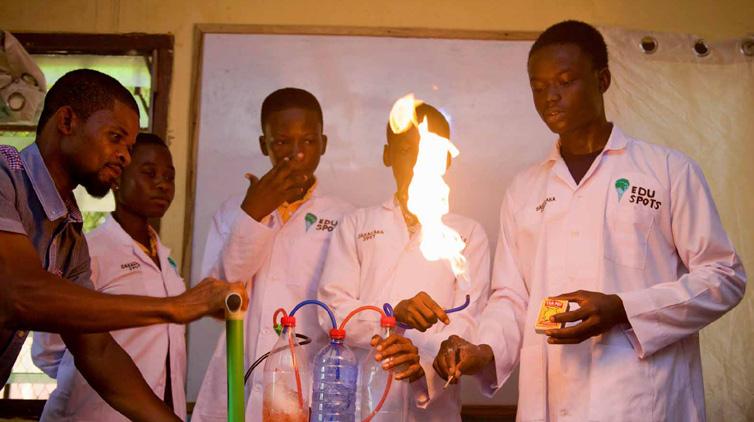
(e.g. in a disused classroom)
Example: Sakasaka Spot, Founded: 2019
(may require joining fee)
Example: Abofour Spot
Founded: 2015
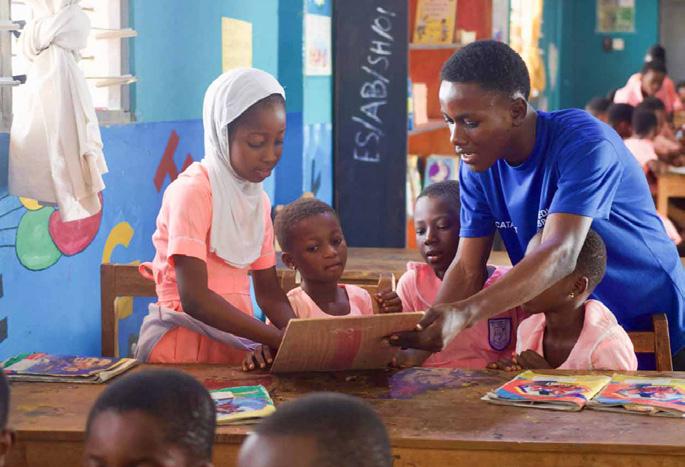

Example: Savelugu Spot
Founded: 2019
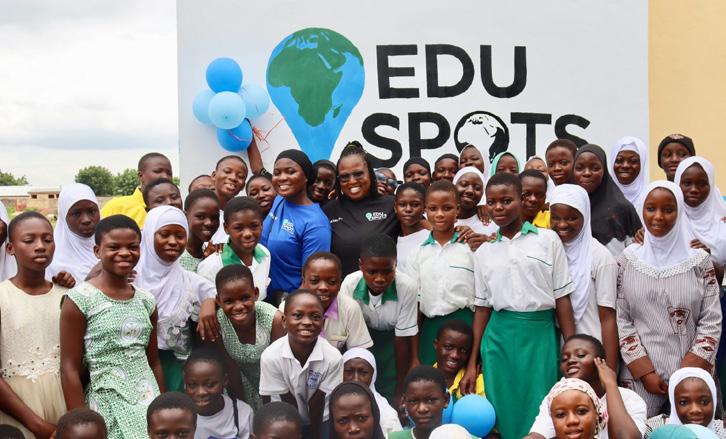
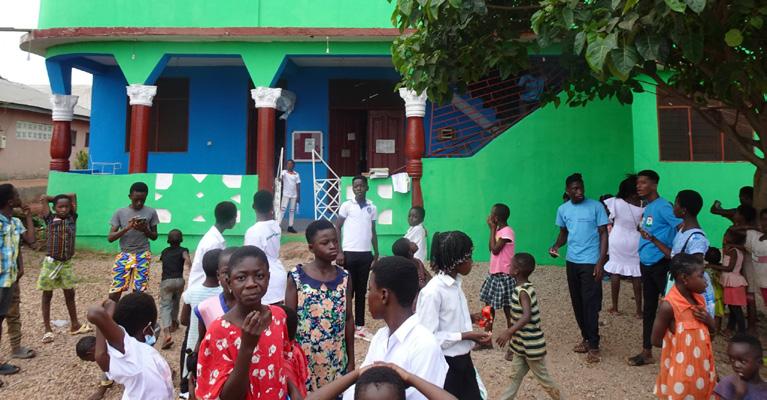
NGO-led or supported Spot
(local NGO - may require joining fee)
Example: Ejura Spot
Founded: 2020
Community-based Spot or library on community land.
Example: AkumadanSpot
Founded: 2016




(international NGO - may require joining fee)
Example: Ho Kpenoe
Founded: 2025
(requires government MOU)
The EduSpots team are in discussions with potential partners to explore possibilities here.
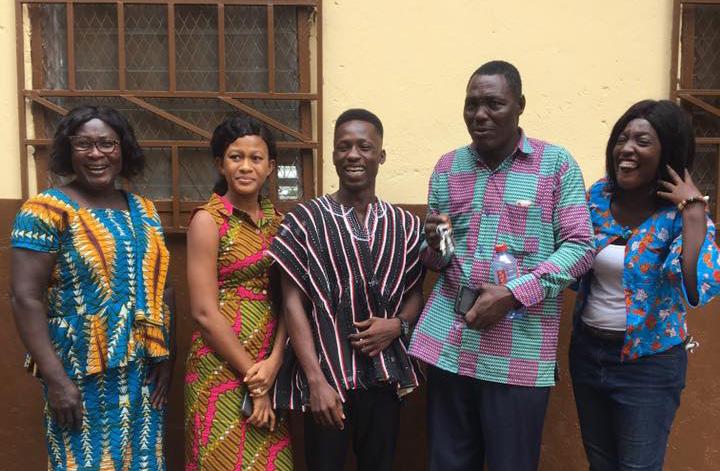
It is important to ensure that the relevant stakeholders who own the land or run the school or project are fully involved in this process.
We will be asking you to provide their contact details, and for a reference at the later stages ahead of us visiting your community at the final stage.
If you are an NGO in Ghana, and keen to talk to us further about integrating our Spot model with your work or supporting us as a delivery partner, please email newspots@eduspots.org to set up a meeting.

We are keen to hear from current Spot teams who would like to work with teams in neighbouring communities to set up a Spot, providing mentorship in this process.
We are also eager for Catalysts who have moved communities to consider setting up a Spot in their new community.
Whilst do not favour applications from existing communities, you may be able to offer invaluable experience and insight to the Spot start-up process. Please reach iut to Faad at newSpots@eduspots.org for further guidance.
You can apply to join the network from any location in Ghana. We are particularly keen to hear from teams that are in close proximity to current Spots.
Please do not apply if you are outside Ghana - at the moment, our focus is on strengthening our network within Ghana.
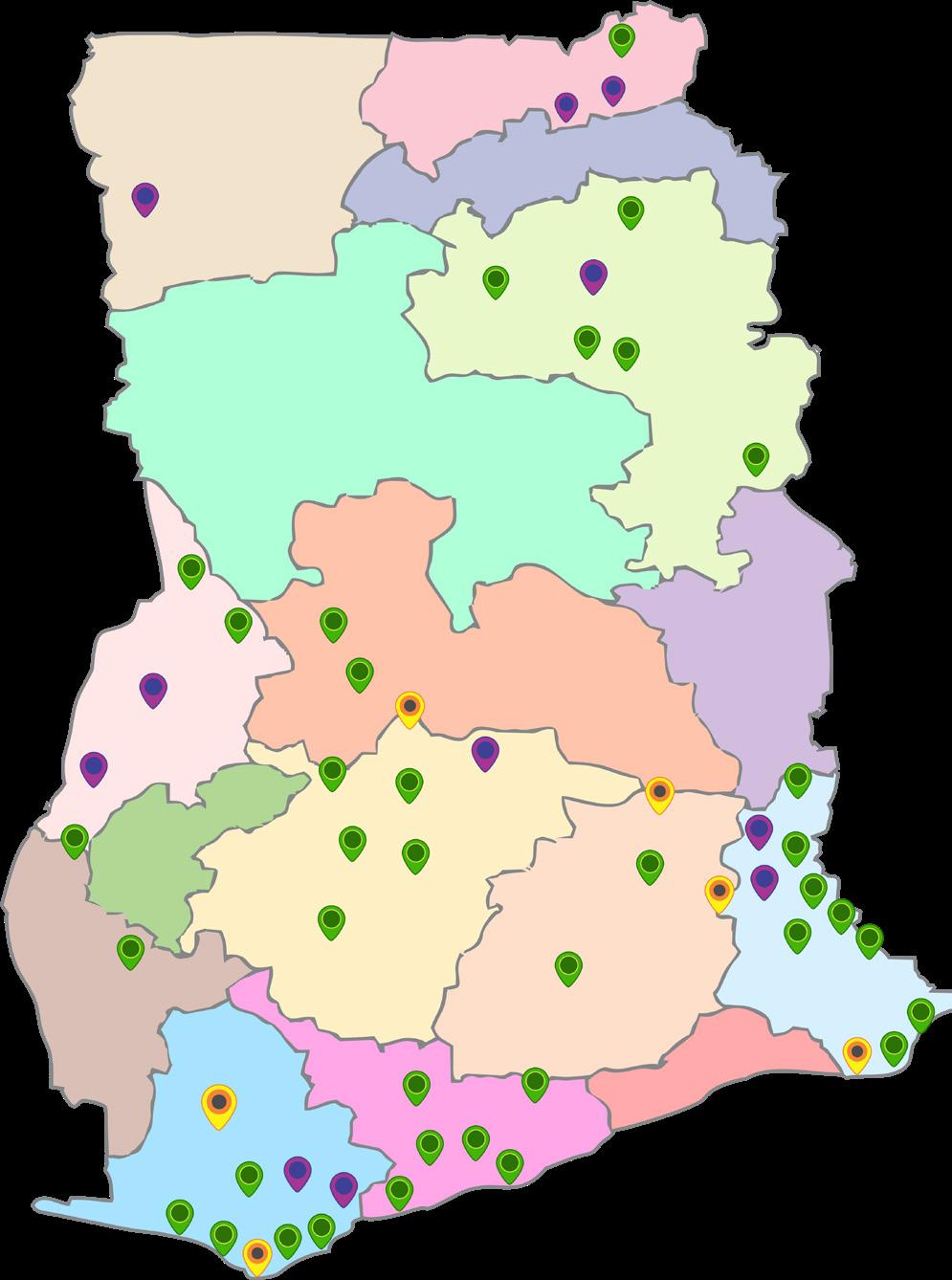

Complete the expression of interest survey monkey form, found online and at this QR code.
Invitation to attend an online information session
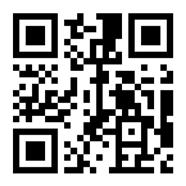
Ensure you have involved your community and built your team
Join the Education Hub and choose your learner strand!
Join the Ignite Programme which includes a six month probationary period
Complete the full application - ask for support from Faad, our Programmes Coordinator, if needed!
Interview process (online) & community visit
Move into the wider Community Leadership Development Programmes accelerator.
Applications will be reviewed on a rolling basis; do get your applications in early! Dates and timelines will be confirmed by the new Spots application form in this process.
We encourage you to take time on drafting your application given that this process is likely to be highly competitive based on the ongoing interest in joining our network.
The number of Spots will depend on the funding available; all new Spot placements are funding dependent. We hope to be able to induct a cluster of new Spots in early 2026.
Any questions?
Reach out to Faad Abdul-Rahman, at newspots@eduspots.org
Like many of our staff, Faad was once a Catalyst himself, at Sakasaka Spot, so will be providing all the support you need in this process.

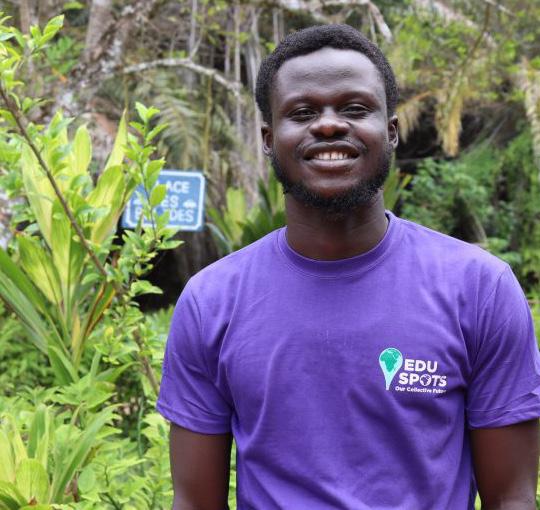
bit more on our co-curricular
The shift towards more learner-centred, inclusive, and practical teaching methods has transformed school-based pedagogy, making education more relevant and engaging for students.
(Expectation State, 2025)
We are looking for Catalyst teams that are keen to lead clubs for learners, and engage in regular leadership activities! These are the different club categories that we will offer in 2026; communities choose one learner strand initially, alongside Spot lead.for Catalysts.
One headteacher commented: “Now, I see myself as a facilitator, guiding students to discover knowledge for themselves. The energy in my classroom has completely transformed.”
STRAND
EDUKIDZ
DIGILIT
ECOSTEM
Early years (KGB3, typically aged 3-8)
B4-6 (typically aged 7-11, with some B7-9 learners as mentors)
B7-B9 (typically aged 11-14), with some primary level learners.
Supporting early years learners with the basic tools to build a strong foundation in literacy whilst upskilling Catalysts and the wider community in early years childhood development understanding. Exploring ways to ensure the Spots are early years friendly spaces.
Advancing learners’ digital and wider literacy skills whilst developing their creativity and critical thinking, enabling learners to make effective use of books and the new EduSpots’ tablets, digital resources, and apps.
Leading activities to nurture creativity and discovery in learners, increasing their engagement and confidence in practical science, technology, engineering, maths and environmental sustainability education, linked to the community context.
IGNITE EQUITY
B8 (typically aged 12-13)

Leading regular activities to involve both girls and boys in addressing gender-based challenges, recognising the role both can play in upholding or challenging gender unequal norms. Some sessions will be held with the boys and girls combined (e.g. communication, gender stereotypes, future careers), and others separately (e.g. sustainable period projects, sexual abuse and harassment). There are communityintegrated events and activities, and the programme supports a learner transition into Catalyst roles in B9.
In addition, Spot Lead runs to develop the skills of Catalysts, promoting teamwork:
SPOT LEAD Catalysts
A structured curriculum with monthly challenges exploring community engagement and participation, team building, systems - including resource, financial & data management, environmental sustainability, communication for change, fundraising, enterprise & events, project design & implementation and digital tools and skills. We have a particularly strong focus on communication skills, with Comms Mondays advancing Catalyst skills across community engagement, social media, design, photography and more.
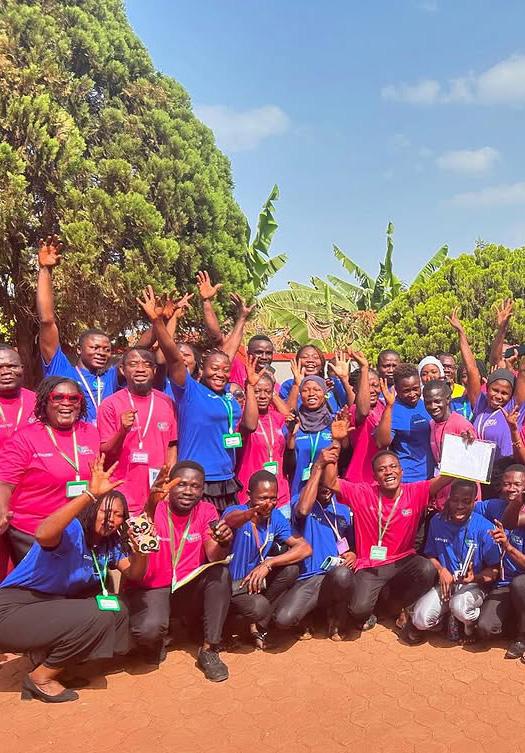


Before joining, I was an ordinary headteacher. I returned not just as a school leader, but as a strategic leader, a change maker, community builder and staff-developer.
(Hamidu Kaadri, Headteacher & Catalyst, Yamfo Spot)

opportunities
Fully-funded in-person Academies across different education strands.
Online professional development sessions: Catalyse Workshops, EduChamps Talks, EduBytes Courses. Training in safeguarding and child protection (Keeping Spots Safe).
Running fun & creative club activities in early years education, digital literacy, environmental sustainability & STEM, and gender equity
Running fun & creative club activities. Engaging in WhatsApp communities of practice.
Mentoring support with a regional coordinator & specialist education coaches .

Catalyst, EduChamps, Learner and Spot of the Month Awards and showcasing on social media and the website with design work and articles.
Certificates recognising you and learners every step of the journey!
Annual awards for exceptional contribution to EduSpots, meeting and engaging with our Patron, Professor Elsie Effah Kaufmann

Additional network benefits
Connections with Catalysts from other communities across Ghana and beyond
Brand association with EduSpots for local projects


Leadership development opportunities
Catalyse Leadership Programme - fully funded 10 month programme with access to project management training and grant funding for your community’s innovative ideas.
Peer Mentoring Programme - apply for a semistaff Peer Mentor role (with allowance/stipend)
Opportunity to apply for staff roles, with automatic first round move to task stage.

NB Local teams are supporting in leading their own collections and fundraisers, and the following is only as funding and partnerships allow:
Books & resource kits per strand, including safeguarding resources
Tablets and wifi devices
Small data allowance to enable upload of challenge submission and access to the app.
Resource and maintenance grant opportunities related to strands, accessed through our in-house competitions!
Support in applying for wider funding (e.g. Youth Mobilisation Fund)
Professional development, funding, and career opportunities are constantly shared
References for committed Catalysts; list your role on CVs/LinkedIn
EduSpots’ Catalysts are found leading change not only in their communities - but all over the country, and in some cases, the world
Facilitating or supporting club sessions for learners, or supporting the Spot in another way such as through organising books or helping learners with their reading.
Sharing your ideas at your local Spot and with the network across Ghana and beyond on WhatsApp!
Supporting your Spot’s development through exciting team leadership activities!
Joining monthly virtual meetings with your team coach, hosting visits from staff
Being responsive by WhatsApp or call, using the EduSpots app and completing surveys when requested
Following EduSpots’ Code of Conduct and Safeguarding Policy at all times, with reference checks required on sign-up!
Committing at least one hour a week to the Spot’s activities, voluntarily.
All Catalysts have to pass through EduSpots’ local and central induction process, including background checks and compulsory safeguarding training, with all registration now taking place via the app.
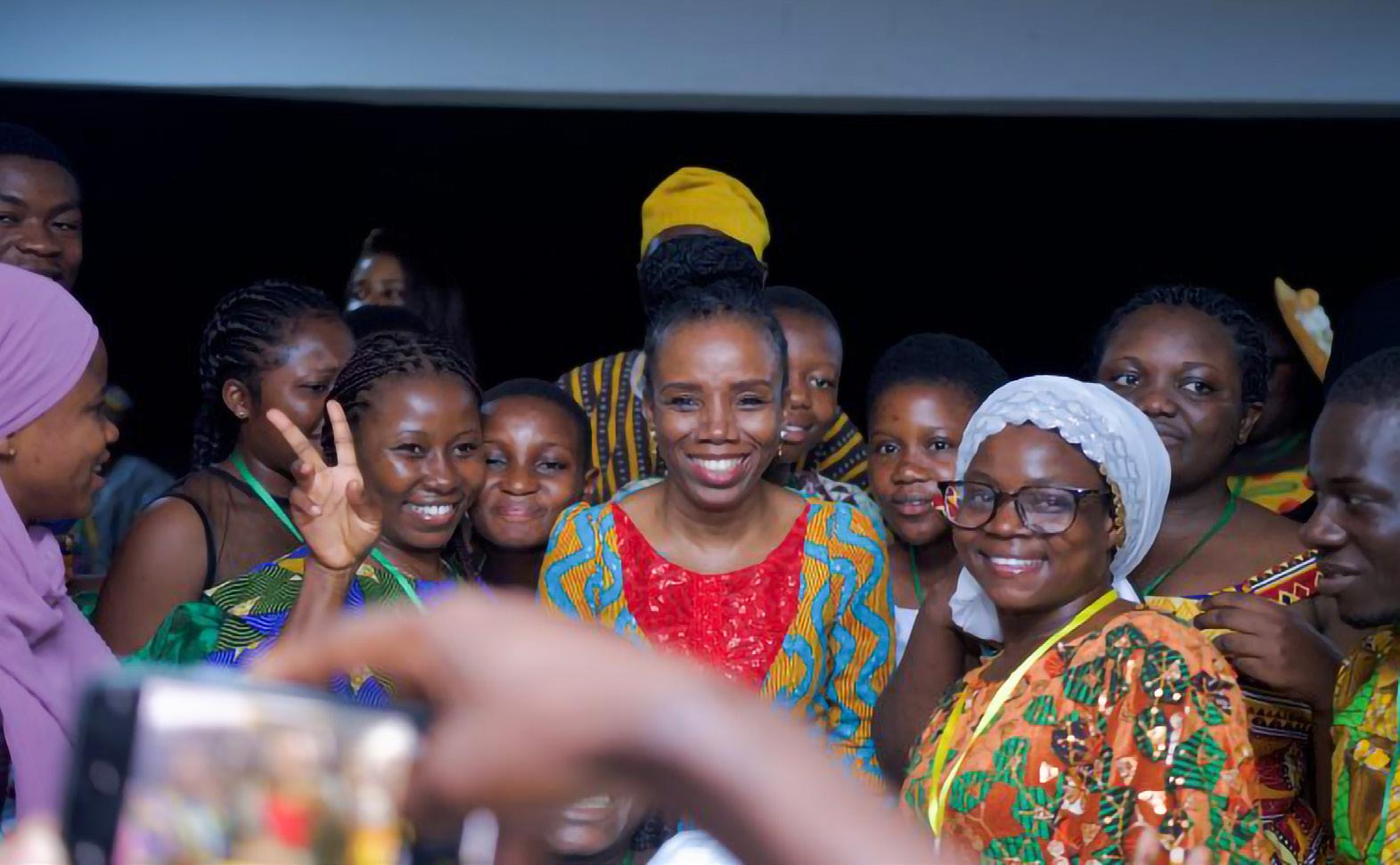

Written by Japhta Appong, a
Catalyst at Aboabo No 4 Spot, a new Spot in 2024
Aboabo No.4 is a cocoa farming community in the Bono Region of Ghana. Aboabo No.4 joined the EduSpots network in November 2024.
The Spot is a school-based Spot located in the Aboabo No.4 Methodist Primary School, serving over 55 learners, led by 9 community-based changemakers, “Catalysts”, with support from local community leaders and parents.
The Spot was created to provide learners with access to resources and skills that go beyond what the regular school day can offer. Many pupils lacked basic reading fluency, digital exposure, and the confidence to speak up in class.
We aimed to change that by creating a space where literacy, leadership, and technology could work in harmony.
Once just a dusty classroom, our Spot is now a vibrant learning space filled with books, laughter, and the glow of tablet screens, a place where ideas are planted and young minds are nourished.
We started by signing on to the Spot Lead and DigiLit Strands. Spot Lead, to develop the leadership and problem-solving skills of our Catalysts to respond to local needs. DigiLit, to enhance the reading, speaking, and listening skills of learners and encourage them to use these skills to communicate in the digital space, equipping them with the tools to shape their own future.
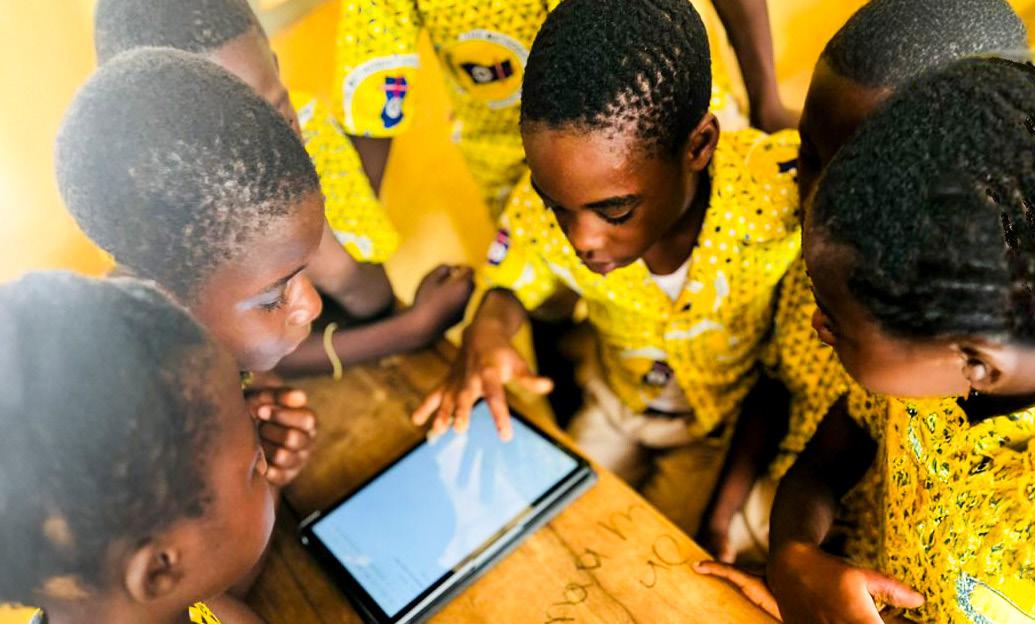

In light of this, we received a donation of 200 books and some digital tools from EduSpots. We set up a mini library with newly constructed shelves. Then came the weekly literacy club meetings, where learners began reading aloud, discussing stories, and building vocabulary. We also introduced basic ICT training, typing, mouse control, and exploring educational apps. Alongside this, Spot Lead sessions helped build confidence, especially in Catalysts who previously shied away from speaking.
We run Spot Lead and DigiLit sessions every week, plus a vibrant reading club and basic ICT skills training. We hope to expand with a third tablet and solar lighting to keep the Spot open during power outages. Long-term, we dream of setting up a “Green Library Garden,” where literacy meets nature.

Before the Spot, many learners didn’t know how to browse the internet or type a letter. Today, they can. Our learners are now engaged in impactful literacy and digital skills activities that are fun and future-focused. This has created a space for them to demonstrate leadership and problemsolving abilities in school and at home, and the community is taking notice
Japhta Appong, a Catalyst at Aboabo No 4 Spot

The EduSpots programme has successfully transformed educational landscapes across Ghana, fostering a new generation of active, empathetic citizens and catalysing community-driven change.
(Expectation State, 2025) by 16th September, 2025

Will you be part of the next chapter in building #OurCollectiveFuture? Apply today!
Email newspots@eduspots.org with any questions or for the application link, which is available on the news section of www.eduspots.org


www.eduspots.org
